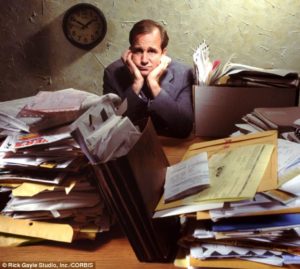Although it appears to be a mundane sort of thing, I find disorganization and chaos to be one of the biggest problems reported by depressed and anxious individuals. Emotional baggage has a way of building up and then expressing itself in an outward display of turmoil — as if a tornado had let loose in your brain and your surroundings.
The symptoms of feeling overwhelmed and not wanting to face the day often stem from not knowing where to start or not wanting to face the mountain of tasks that lay ahead. I have found folks to be so bogged down with even the everyday task of leaving the house on time that their entire day is a mess before they ever get started. By 8 am they are frazzled.
There are screaming children, pets that need walking, work begins at a certain time, the laundry isn’t done, and available clothing is something picked out of the bin from the week before that didn’t make it to the dry cleaner. Stress chemicals are running rampant, and irritability and panic set in as well as resentment of the household, job, family and everything else.
What is worse is that typically if disorganization is a problem at home it is a problem at work as well. A cluttered desk, half-finished tasks, and unmet deadlines are the career version of the problem and are also with you all day.
Does your automobile look like a homeless person’s shopping cart? If so, none of your major environments is peaceful. There is nothing pleasant about your surroundings, and this is a major stressor.
The problem is not that you have too much to do or work full time, it is that you have not found a routine and effective organizational plan, or you found one but are not consistent in following the plan.
Running around willy-nilly, being chronically late, never being able to find things, and having a dirty or sloppy house are stressful conditions and contribute to the anxiety depression cycle. Things scattered about affect your ability to concentrate, and irritability sets in if not outright anger.
Simply put, the stress chemicals from disorganization eat up the good chemicals needed for mood stabilization. With that process in effect, you feel depressed and overwhelmed.
Look around your house. It should be your sanctuary, not a hell-hole screaming your name to come clean it. The house and time management issues are all about the planning and execution of a schedule and routine. If something is not getting done or is causing you distress in the household it is because you have not found the right system for you.
Very simply, a place for everything and everything in its place is a good saying to live by. Think of the simplicity of that statement. Yet this is the biggest bug-a-boo I see, not knowing where you left your car keys, clothing, sports equipment, checkbook, you name it.
We often allow our emotional state to dictate these sorts of practical matters. “I am so depressed I don’t care what the house looks like.” “I am so nervous I can’t concentrate.” “I am so ADD (Attention Deficit Disorder), I will never be able to organize myself.” It does not matter if you are depressed or anxious, your house and time need streamlining, and with that will come an improvement in your symptoms. You will feel an immediate shift just from the empowerment and taking control of your life. If you really are ADD then organization and time management are the very set of skills that you need.
Getting Started
To get started take an inventory of the areas where you need organizing. Maybe there is just one area out of control or maybe the entire place needs an overhaul. Either way, it can get done and not be overwhelming by breaking it down into sections and tasks. The major areas that cause disruption are your house, car, purse or wallet, finances, and paperwork.
I am now going to take you through a general plan that you can begin to institute immediately.
- Get out a pad of paper and look around. Jot down room by room what the major problems are such as laundry everywhere, kid’s toys, and paper clutter. Where are the major stressors?
- Now go to where these items would ideally reside. Is there enough room for them all to be put away at once? Do you need to get rid of some of it or do you need more space or better organization of it? If you have enough space, then it is probably more a problem of time management and routine. If there isn’t enough space, you may be keeping too much stuff or just not have the proper storage solutions.
- List all chores that require travel such as groceries and dry-cleaning. Can you do those on your way home from work? Can you do them all at once in order to be more efficient rather than make multiple trips?
- Think through your morning routine, this is usually where the day starts to go downhill. How much time do you need to get yourself ready? Pets? Kids? Breakfast? Pick up your house before you leave so as not to come home to a depressing mess. If you have a family, I suggest getting up 2 hours prior to when you need to leave or when they need to be out the door. This gives you time to get ready, get them up and ready, prepare and have breakfast as a family, and squeeze in a 30-minute walk or exercise of some sort. In order to do this, you will need to have already planned the night before for things such as:
- Lunches
- Clothing
- Homework
- Projects of your own
- List of priorities for the day, knowing exactly where to focus your energies on any given day
- Gas in the car
 Now think through your evening routine. How do you get the above things done? Is there too much stuff in your evenings? Maybe the kids are in too many activities or you need help getting them around. Are you eating healthy food at night? Are you eating too late and not cleaning up because you are exhausted? Then you have to get up to a mess and again it’s all downhill from there. Remember you are in control of your schedule and your life, and sometimes too much is just too much. Even though you are trying to provide a quality of life by having many activities available for your family, it is not a quality of life if you are depressed and agitated and the house is a mess and you are eating takeout every night. Think about the memories you are creating.
Now think through your evening routine. How do you get the above things done? Is there too much stuff in your evenings? Maybe the kids are in too many activities or you need help getting them around. Are you eating healthy food at night? Are you eating too late and not cleaning up because you are exhausted? Then you have to get up to a mess and again it’s all downhill from there. Remember you are in control of your schedule and your life, and sometimes too much is just too much. Even though you are trying to provide a quality of life by having many activities available for your family, it is not a quality of life if you are depressed and agitated and the house is a mess and you are eating takeout every night. Think about the memories you are creating.
Now you should have an idea of where the problem areas are and where your time is being utilized. Here are some general guidelines that will make a world of difference immediately if you put them to work for you.
House
- Keep dishes and plates put away all the time, fill dishwasher after every meal.
- Do a good cleaning once a week. Enlist the family, including children, to help especially in their own rooms. Many people feel guilty making their children learn chores but there is nothing to feel guilty about. They are simply participating in the household and will have to run their own households someday. If they learn now they will not have to struggle with these issues later.
- Keep money matters in one place as well as files for all your important papers and issues such as credit card information, taxes, medical, legal, travel, etc.… It is very nice to be able to put your hands right on something the minute you want it.
- A place for everything and everything in its place. It’s really that simple.
- Go with a schedule for cleaning, weekly daily, monthly and seasonally. Then stick to it.
Car
Does your car look like you live in it? This too is very stressful and carries chaos from your home into your driving. You will be more distracted and harried while driving if your car is a mess.
- Clean it out daily from anything you may have eaten, wrappers, coffee cups and work-related papers.
- Wipe console free of dust and grime with a wipe made for this to free your view of dirt.
- Take it to the car wash once a week if finances permit or at least every other week. Allow them to vacuum it and wipe it down.
- Each child riding in the car is responsible for his or her own seat area if old enough.
- Dog nose prints on window wiped off daily.
Purse/Wallet
Another war zone, filled with extra papers, bunched up money, cough drops, candy with dirt embedded in a wrapper, year-old receipts, hair items and cosmetics. This is a virtual dumping ground of things we collect daily. None of them should be here.
Go through all purses and wallets, and take out all junk. If you use multiple purses clean out one per day until they are all done.
Vacuum or wipe out purses as you go.
I know these things sound very simplistic and not the topic you might think to bring to a psychologist. But I really can’t tell you the number of times that I have seen clients experience great relief from their symptoms of depression, anxiety, and anger just from taking control of their life routines and belongings. It frees up your time for more constructive thinking, planning and daydreaming!
There are many books, as well as internet resources, pertaining to organization and time management. If this is an issue for you, begin reading one today! It’s never too soon to start, and you won’t believe how just 15 minutes a day dedicated to organizing your home can make you feel better fast!
About Audrey Sherman, Ph.D.
Sherman is a psychologist, speaker and author of the book Dysfunction Interrupted-How to Quickly Overcome Depression, Anxiety and Anger Starting Now. She has been working with individuals and families for over 20 years and her expertise is in helping others to overcome the emotional baggage that keeps them stuck in unhappy and unproductive relationships, jobs and more. She currently works with clients in person or via Skype or telephone. To learn more about Dr. Sherman, her book, and workshops you can visit her website, PsychSkills.com.














